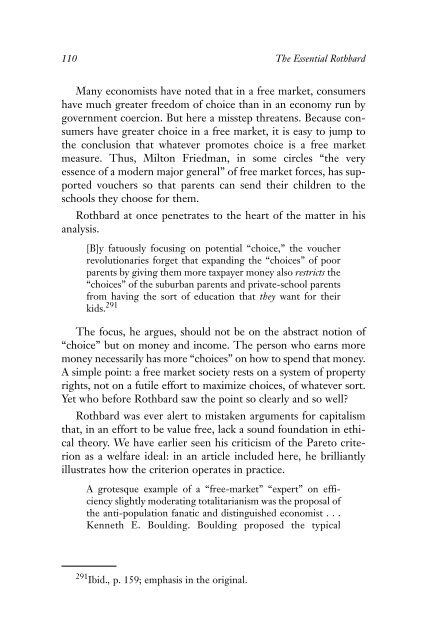The Essential Rothbard - Ludwig von Mises Institute
The Essential Rothbard - Ludwig von Mises Institute
The Essential Rothbard - Ludwig von Mises Institute
Create successful ePaper yourself
Turn your PDF publications into a flip-book with our unique Google optimized e-Paper software.
110 <strong>The</strong> <strong>Essential</strong> <strong>Rothbard</strong><br />
Many economists have noted that in a free market, consumers<br />
have much greater freedom of choice than in an economy run by<br />
government coercion. But here a misstep threatens. Because consumers<br />
have greater choice in a free market, it is easy to jump to<br />
the conclusion that whatever promotes choice is a free market<br />
measure. Thus, Milton Friedman, in some circles “the very<br />
essence of a modern major general” of free market forces, has supported<br />
vouchers so that parents can send their children to the<br />
schools they choose for them.<br />
<strong>Rothbard</strong> at once penetrates to the heart of the matter in his<br />
analysis.<br />
[B]y fatuously focusing on potential “choice,” the voucher<br />
revolutionaries forget that expanding the “choices” of poor<br />
parents by giving them more taxpayer money also restricts the<br />
“choices” of the suburban parents and private-school parents<br />
from having the sort of education that they want for their<br />
kids. 291<br />
<strong>The</strong> focus, he argues, should not be on the abstract notion of<br />
“choice” but on money and income. <strong>The</strong> person who earns more<br />
money necessarily has more “choices” on how to spend that money.<br />
A simple point: a free market society rests on a system of property<br />
rights, not on a futile effort to maximize choices, of whatever sort.<br />
Yet who before <strong>Rothbard</strong> saw the point so clearly and so well?<br />
<strong>Rothbard</strong> was ever alert to mistaken arguments for capitalism<br />
that, in an effort to be value free, lack a sound foundation in ethical<br />
theory. We have earlier seen his criticism of the Pareto criterion<br />
as a welfare ideal: in an article included here, he brilliantly<br />
illustrates how the criterion operates in practice.<br />
A grotesque example of a “free-market” “expert” on efficiency<br />
slightly moderating totalitarianism was the proposal of<br />
the anti-population fanatic and distinguished economist . . .<br />
Kenneth E. Boulding. Boulding proposed the typical<br />
291 Ibid., p. 159; emphasis in the original.

















